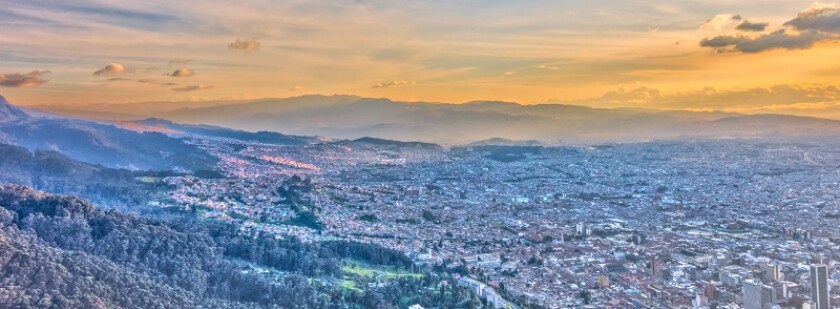Lisa Viscidi, programme director at the Inter-American Dialogue, looks at the pro-investment sentiment sweeping across Latin America

IFLR speaks with Lisa Viscidi, director of the energy, climate change and extractive industries program at the Inter-American Dialogue. Viscidi analyses recent developments in Latin America's energy markets, particularly in relation to broad-sweep energy market reforms in Brazil and Mexico. While the fundamental dynamics of the region's economies and the momentum behind investor friendly policies suggest that Latin America will continue to be an attractive investment destination, the renegotiation of NAFTA and other risks loom in the background.
What is your reading of the energy sector across Latin America and what are the recent reforms in Mexico and Brazil responding to?
There is a trend toward more market-oriented and investor-friendly reform. You see it in Mexico and Brazil, but you also see changes to policy to attract investment in Colombia, Ecuador and Argentina. This is a general trend. It responds mostly to the need to reverse policies that have slowed oil production and led to lower government revenues. In most cases, the changes we are seeing are in response to lower oil prices. Perhaps one exception is Mexico, where the initial reforms happened before oil prices dropped and were made to confront a chronic systemic problem with the sector and a steep decline in production and revenues.
In general, reform is happening because of new governments coming into office with a more private sector-oriented approach to energy and to economic policy. These reforms are about domestic politics and they reflect a move away from nationalism and nationalisation across other sectors as well. This theme is especially true in Argentina, where there are major macro-economic problems that President Mauricio Macri wanted to take on and energy was just one of a number of things. There is a similar case in Brazil, where there was massive public debt and clearly a lot of problems in the oil sector and with Petrobras, as well as other economic sectors. In Brazil this is part of President Michel Temer's reform agenda.
Have these reforms changed the dynamics for private/public sector participation in projects?
That changing dynamic is happening and we are seeing more private companies participating in the energy mix.
There is also the decline of the national oil companies (NOCs), which is a related but also a separate issue. If you look at all the NOCs in the region they are not where they were 10 or 15 years ago. Many of them have declining reserves, declining profits and a bleak financial situation. Some are starting to turn around but NOCs are no longer as powerful as they used to be. In the case of Brazil, Petrobras was not hit that badly by low oil prices because the vast majority of its oil is for sale in Brazil and Brazil had controlled the price of the market. Petrobras was hit by debt and the fact that its debt was 80% dollar denominated, so when the Brazilian real weakened this debt became hugely inflated. In Mexico, Pemex suffered a lack of investment in technology to maintain production levels.
There is also a similar trend outside oil and gas. For example, governments are looking at how to reform state utility companies and one of the options they have is to introduce more competition from the private sector, whether it is by selling part of the national utility company or allowing other players to come in, as in Mexico.
You have noted before that climate change mitigation enjoys strong support among Latin American populations. Is that being reflected in current energy policy and in renewable investment?
I would say yes. There are a lot of policies to support renewable energy. Many countries including Brazil, Mexico and Peru have renewable energy auctions for specific clean technology, especially solar and wind, and in some cases geothermal. They also have fiscal incentives, carbon targets and carbon credits. The popular support for climate change has overall translated into renewable energy investment and in a lot of the countries' nationally determined contributions for the Paris Climate Accords there is a focus on non-hydro renewable energy and there is strong public support for that.
Does the regulatory approach to the renewables sector vary a lot across the region?
I would say that Latin America has not taken a very different approach to some European countries. There is concern about making energy too expensive for consumers and they do not want it to hit the fiscal budget. They have avoided subsidies like feed-in tariffs. In Brazil, the policies have really pushed non-hydro renewables very quickly. The advantage that developers have in Brazil is that the state development bank (BNDES) has a large amount of capital available at low interest rates. There is also a huge domestic market there, whereas several of the other markets are quite small and that makes it harder to attract developers.
What are the greatest challenges to creating strong frameworks for the right sort of energy investment?
There are a lot of challenges. One of the top ones that I see is political and regulatory risk. There are constant changes in Latin American energy policy. There are some exceptions though: in Chile policy has been pretty similar and stable across several administrations. But for the most part you can have a new government come in and see a radical swing in one direction or the other. On the regulatory level you can also see a lot of changes and a lot of bottlenecks and red tape. Another challenge is fiscal constraint. Many countries that heavily rely on revenue from oil and gas do not want to give subsidies to renewable energy, even though some are subsidising fossil fuels.
In oil and gas, on one level it is driven by oil prices. We have seen some big investment projects recently especially in Brazil because the pricing is now a lot more attractive. Offshore is doing well because oil prices are high enough to support offshore project. Onshore there are a lot of complications, for example many communities do not want oil projects in their area, so getting the social licence to operate is very hard and going offshore is a lot easier in that sense.
How important are development banks to the region's energy market?
For renewables projects, development bank financing is really critical. Outside of Brazil the Inter-American Development Bank (IDB), the World Bank and Development Bank of Latin America (CAF) are active. There are also other state development banks aside from BNDES. In Argentina, in the new renewable energy policy framework under Macri, they created a fund for renewables projects. The idea of this fund is not just finance projects but to give incentives, such as a low interest loan to get things started. Development financing is really very important to catalyse those types of investments.
Has the Trump administration had a material impact on the profile of energy investment in the Americas?
This is hard to measure. I do see some reluctance to invest in Mexico and the biggest direct threat of the Trump administration to investment in energy is the Nafta renegotiation. There are a lot of ways that it could impact energy. There is a lot of concern that the whole process could fall apart and some companies are waiting to see how it pans out before making decisions about Mexico. For the rest of the region, more generally the lack of energy diplomacy could in the long term have an impact on investment. For previous US governments there was dialogue on energy and more engagement with other countries to promote investment, and that has made a big difference to moving investment forward. Energy investment depends a lot on trade and on the trade agreement between countries, so if that breaks down it will have an impact. It has been less than a year so I don't think you could say clearly that there has been an impact.
Will uncertainty on Nafta linger for long enough to have an impact?
I think the Nafta negotiations are going to drag on longer than the US government would want. They are not going to be wrapped up this year, not before the elections in Mexico next year and maybe not before the end of next year. They may only conclude in 2019 and I think this process is going to drag on. We then don't know what the final agreement will look like and whether the whole deal will fall apart.
And in the meantime, is there a gap that needs to be filled?
There are plenty of other countries investing including China, Russia and European countries. The uncertainty definitely opens up the space for these others and there are plenty of people who can fill that gap.
Will Latin America remain an attractive region for project finance?
Yes, because energy demand is growing. It is a developing region with growing economies and one where energy demand is still tied to economic growth, it is not decoupled from economic growth as in Europe and the US. Electricity demand is growing and the transport sector is seeing massive growth. These alone will keep it an attractive region. There is also a huge untapped resource base, it has incredible resources for solar, for wind and huge untapped resources for oil and gas – the pre-salt alone could make Brazil one of the three of four largest offshore oil producers in the world. I think the region will definitely continue to be dynamic for project development.
About the author |
||

|
|
Lisa Viscidi Program director, Inter-American Dialogue T: +1 202 463 2571 W: www.thedialogue.org/experts/lisa-viscidi/ Lisa Viscidi is the director of the energy, climate change, and extractive industries program at the Inter-American Dialogue. A specialist in Latin American energy, Viscidi has written numerous reports and articles on energy policy and regulations, oil and gas markets, climate change, social and environmental impacts of natural resources development, and the geopolitics of energy. Her articles have been published in the Financial Times, The New York Times, Foreign Policy, the Miami Herald, Houston Chronicle, the Harvard Review of Latin America and Foreign Affairs. Viscidi frequently presents at conferences throughout the US and Latin America and has been quoted by the Wall Street Journal, Bloomberg, Reuters, and other news outlets. She was called to testify before the House Committee on Foreign Affairs' Subcommittee on the Western Hemisphere in 2017. Viscidi received a Fulbright specialist grant in 2017 to teach a course on climate change and environmental policy at the Universidad del Rosario in Bogotá. |
